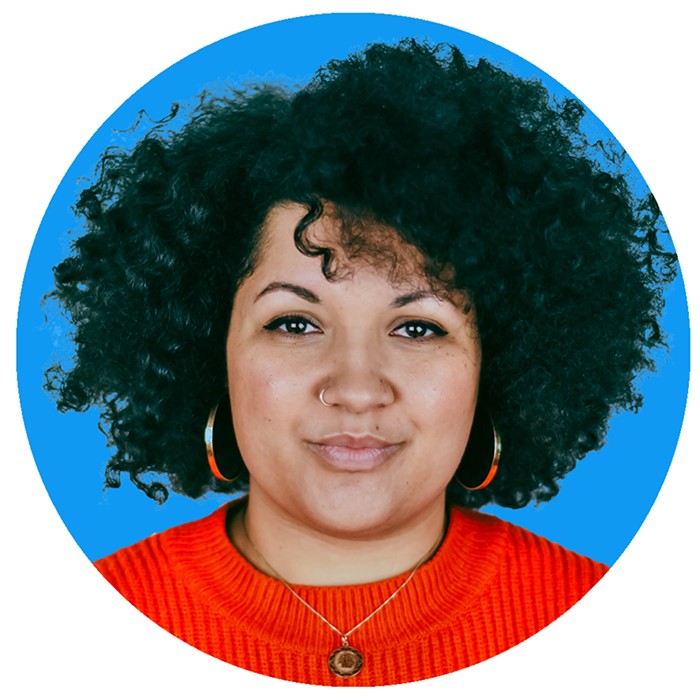Rapper/singer Jidenna’s new album 85 to Africa is a trip through the African diaspora that verges on sonic cinema. (The title refers to Atlanta’s I-85, which’ll get you to the airport where you can catch a direct flight to Africa.) Having shelved his three-piece-suit look from “Classic Man,” his sophomore album 85 to Africa showcases a more fully realized, relaxed Jidenna that feels more natural. Finger waves now braided and arms tatted, Jidenna dons a white tee (with an American flag on it) tucked into structured, patterned trousers while an interstate highway bustles behind him. Jidenna’s newfound mission—to inspire Black Americans to find home wherever they go and reestablish their connection to the motherland through travel and economic support for the region—was inspired by his own experience of displacement. In 2017, he was evicted from the Atlanta mansion he and his team were renting after the owner lost the property in a foreclosure auction and didn’t tell them. Greeted by the barrel of a gun at 6 am, Jidenna’s home of three years was swarmed by cops; movers threw his possessions into boxes while the new owners looked on and smiled. “Even with all the success, I was still another nigga displaced,” Jidenna says in a video trailer explaining the album. “Where could I go, where my land was my land? Where my home was my home?” It was then that Jidenna decided to go to Africa indefinitely.
The 11-track project has fantastic, varied production—largely handled by Wondaland affiliate Nana Kwabena. From Afrobeats to highlife, trap, soul, hip-hop, and more, Jidenna’s globally minded message is felt. It kicks off with American hip-hop on “Worth the Weight,” which samples Kool and the Gang’s “Who’s Gonna Take the Weight,” and features the voice of Nigerian musician Seun Kuti. The title track (also hip-hop) sees Jidenna hit I-85 with his boys, complete with car-mimicking horns.
What I love about 85 to Africa is how references and terms are included without explanation, forcing me to do my Googles and learn new words. After lead single “Tribe,” and “Babouche” featuring GoldLink (and named after a Moroccan slipper), “Sou Sou” is a hot highlight and makes sexual innuendos out of a sou sou (a group savings arrangement common in the Caribbean). Jidenna finds himself showing appreciation for the power of Black women on the Spanish guitar-sampling “Sufi Woman,” and “Zodi” featuring Mr. Eazi. The latter sees Jidenna courting a woman who subscribes to the Zodiac (“She go look ‘pon the signs and constellations/But it is right in front of your eyes”).
“Vaporiza” (“You my vaporiza, vaporiza/Ooh, I’m breathin’ easy when I’m with you”) is breezy, romantic, and shows off Jidenna’s versatility, as “Bambi” did on The Chief. Jidenna’s genuine happiness is palpable as he sings “Juju lady, amuse me baby/You are so amusing baby/I just wanna live my love with you, ay.” “Pretty & Afraid” (co-produced by Wondaland’s musician Roman GianArthur), is an exquisite, psychedelic venture into Jidenna’s psyche, as he vocalizes his fear of death and not wanting to have any regrets. The beauty continues on the sweet rap/sung nostalgia of “Jungle Fever,” about growing up in an interracial family living in Nigeria and the US (Jidenna has a Nigerian father and a white American mother). Album closer “The Other Half” featuring Mereba and duo St. Beauty (also of Wondaland Records) is another highlight, with three distinct parts in its seven minutes. Over a sample of Tim Maia’s “Where Is My Other Half,” Jidenna addresses the “demons” taking his friends, boys pretending they’re men, toxic masculinity, and forces that pit Black men and women against one another. He makes a call to action to be “greater men than we’ve ever been.” Featured vocals from the three women balance out Jidenna’s frustration by extending an olive branch: “We can see eye to eye/They know it’s by design.” By 85 to Africa’s end, I’m convinced we should follow this man’s caravan.














